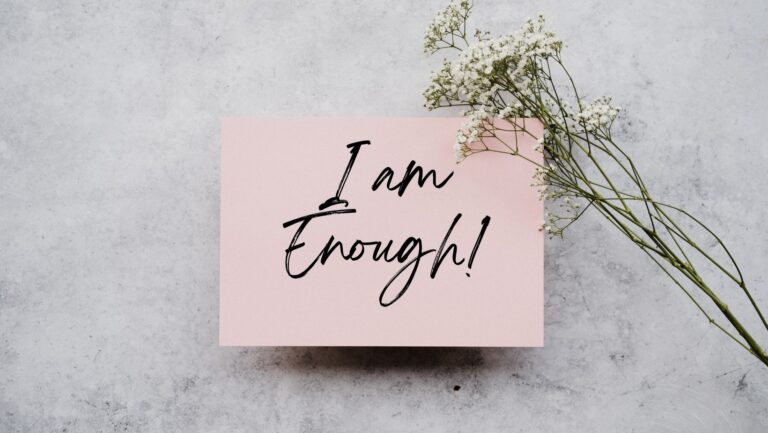The 20 Best Strategies for How to Love Yourself
DISCLOSURE: This post may contain affiliate links, meaning I make a commission if you purchase through my links, at no extra cost to you. For more information, please read my Disclaimer.

If you’re wondering how to love yourself, it starts with understanding the meaning of self-love. Self-love is knowing your authentic self, recognizing your God-given worth, and honoring your value. It’s realizing that your needs, desires, and dreams matter. It’s believing that your life has purpose and significance.
When you learn how to love yourself, you stop looking to others for validation. You’re no longer desperate for outside affirmation because you begin to understand just how incredible God made you. You can confidently affirm yourself and walk in truth—free, whole, and rooted in your identity.
Why Is There a Struggle?
The struggle with self-love is often rooted in the way we were raised or conditioned. Many of us were taught that putting ourselves first was selfish, or that our needs should always come last. If you’re learning how to love yourself, this conditioning must be unlearned.
Society also plays a huge role. We’ve let the world define who we are, rather than embracing God’s truth about us. This creates a negative inner dialogue and a disconnect from our authentic selves. Learning how to love yourself means silencing those outside voices and returning to God’s Word as the standard.
The Process of Loving Yourself
Loving yourself may be a challenging process, but it is completely worth it. Knowing who you are, embracing every aspect of your being, and creating a healthy mindset leads to a more joyful life.
How to love yourself begins with self-discovery and aligning your identity with the truth of who God created you to be. You are fearfully and wonderfully made (Psalm 139:14) and created in His image (Genesis 1:26). That’s the foundation.
What Does It Mean to Love Yourself?
To truly love yourself means to love everything about you—your personality, your physical traits, your strengths, and even your story. It means embracing your journey and being unapologetically you.
When learning how to love yourself, you let go of shame, people-pleasing, and perfectionism. You begin walking in freedom and authenticity—even when it feels uncomfortable. Loving yourself means showing up as your full self, not a filtered version the world expects.
Why This Is Important
Scripture reminds us, “You shall love your neighbor as yourself” (Mark 12:31 NKJV). We often focus on loving others, but overlook the part that says “as yourself.”
If you don’t know how to love yourself, you may find it hard to love others deeply and genuinely. A heart filled with self-doubt or shame struggles to pour out love. But when your heart is full of grace, truth, and self-acceptance, it overflows into your relationships.
Check out my Amazon storefront for some great recommendations.
How to Love Yourself Practically
Learning how to love yourself is not about vanity—it’s about stewardship. You are God’s creation, made in His image, and practicing self-love is a way of honoring what He has made. Here are powerful, biblical ways to live this out daily:
1. Learn what God says about you.
The foundation of loving yourself starts with believing what God says is true about you. Scripture reveals your identity—you are chosen, redeemed, beloved, and created with purpose. Root your worth in God’s Word, not in your performance or the opinions of others. Use a scripture writing plan that focuses on identity in Christ to meditate on these truths regularly. This is the first step in truly knowing how to love yourself as God does.
2. Be intentional about self-discovery.
Spend time reflecting on your values, desires, and the unique way God wired you. Ask yourself honest questions like: What matters most to me? What do I enjoy? What brings me peace? This journey of self-discovery is a critical piece of learning how to love yourself—because it helps you recognize the beautiful uniqueness God placed inside of you.
3. Take spiritual gift and personality tests.
These tools are not labels, but they can bring clarity to how God designed you. Discovering your spiritual gifts and personality traits can give you confidence in the roles you’re called to fill in life, ministry, and relationships. They help you affirm how special and intentional God was when He made you.
Spiritual Gifts Test
Strengths Test
Personality Test
4. Create a list of your strengths.
Write down your strengths, accomplishments, and positive attributes. Then, put that list where you can see it daily—on your mirror, your desk, or your phone. This serves as a tangible reminder that you have value and purpose, even on hard days. It’s a simple but powerful way to reinforce how to love yourself through positive reinforcement.
5. Write “I love…” statements.
Using your list of qualities, write personalized statements like “I love my creativity,” “I love the way I care for others,” or “I love the wisdom God has given me.” Say them out loud. These declarations help reshape your inner narrative and grow your self-love from the inside out.
6. Speak affirmations daily.
Romans 12:2 teaches us to be “…transformed by renewing our minds“. Speaking godly affirmations over yourself each day is one of the most effective ways to fight negative thoughts and build a healthy mindset. Say things like, “I am fearfully and wonderfully made,” “God delights in me,” or “I have value regardless of what I do.”
7. Stop comparing yourself.
Comparison robs you of joy and blinds you to your own beauty. God didn’t make you to be like anyone else. When you embrace your individuality, you are practicing a key step in how to love yourself biblically and fully. Limit comparison triggers like social media if needed and stay grounded in gratitude for your journey.
8. Practice daily gratitude for yourself.
Each day, thank God for something specific about yourself. Maybe it’s your resilience, your sense of humor, your intuition, or your kindness. Gratitude isn’t just for external blessings—it also helps you see yourself through God’s lens and grow in appreciation for His craftsmanship in you.
9. Set boundaries.
Boundaries are not selfish—they are wise and healthy. Saying “no” when needed is one of the most respectful ways to love yourself and preserve your emotional, spiritual, and physical energy. Jesus Himself set boundaries, withdrew from crowds, and prioritized His well-being.
10. Treat and celebrate yourself.
You were created to experience joy! Whether it’s taking yourself out for coffee, getting a massage, or buying something that makes you smile, these small acts of kindness toward yourself reinforce your worth. Celebrating yourself is a healthy expression of love, not indulgence.

11. Be honest with yourself.
True freedom comes from truth. Don’t hide from your flaws, pain, or past—bring them to light and let God walk with you through healing. Being honest with yourself allows you to grow in self-awareness and maturity, which are vital in learning how to love yourself with grace and truth.
12. Forgive yourself.
Let go of the guilt and shame from past mistakes. God has already forgiven you through Christ—now it’s your turn. Forgiveness is a key that unlocks emotional healing and peace. Remember, your past does not define you; God’s grace does.
13. Allow for rest.
God modeled rest in creation and commands it for our good. Taking time to rest is a holy act of self-love. It says, “I trust God to sustain me, and I respect the limits of my body and mind.” Rest restores and refreshes your spirit.
14. Feel your feelings.
God gave you emotions—they are not weaknesses. Acknowledging how you feel without judgment is part of emotional health. Don’t suppress your emotions; instead, invite God into them. Processing feelings in a healthy way is crucial in understanding how to love yourself fully.
15. Take care of your physical health.
Your body is the temple of the Holy Spirit (1 Corinthians 6:19). Nourishing your body with movement, sleep, and balanced nutrition is not just about looking good—it’s a sacred way of showing yourself love and care.
16. Change your inner dialogue.
You are always listening to yourself. Replace self-criticism with self-compassion. Speak kindly to yourself just as you would to a friend. Words matter, especially the ones you say to yourself every day.
17. Put yourself first when needed.
Loving others well begins with taking care of yourself. Prioritize your well-being, especially when your emotional, mental, or spiritual reserves are low. You can’t pour into others if your own cup is empty.
18. Be selective with relationships.
You were never meant to maintain close ties with everyone. Surround yourself with people who speak life into you, encourage your growth, and love you as you are. The right relationships will support you on your self-love journey.
19. Remember your value isn’t in appearance.
Society often places worth on external beauty, but God looks at the heart (1 Samuel 16:7). Your value comes from who you are in Christ, not what you look like or what you wear. When you anchor your identity in Him, you will begin to understand how to love yourself beyond the surface.
20. Allow yourself to make mistakes and be ok with your imperfections. It is okay to not be perfect. Nobody is perfect and everybody makes mistakes, even those people you look up to. There is nothing wrong with you and it does not make you less valuable because you are imperfect. Acknowledge any mistake you have made and then let them go
Final Thoughts on How to Love Yourself
Learning how to love yourself is not a one-time decision—it’s a daily commitment. It’s not about vanity or perfection, but about stewardship of the life, mind, body, and spirit God has given you. It’s a spiritual journey that leads to wholeness, peace, and purpose.
Whether you’re just starting or continuing this journey, remember this: You are already loved by God. Learning to love yourself is simply agreeing with Him.
If this post resonated with you, then my workbook, You Don’t Actually Suck: A Guide to Seeing Yourself Through God’s Lens and Not Your Own, is exactly what you need. This guide will help you break free from negative self-talk, replace lies with truth, and learn to see yourself the way God sees you—worthy, loved, and full of purpose.
Inside, you’ll find practical exercises, biblical encouragement, and space to craft affirmations that speak life over yourself. Don’t let negativity hold you back any longer—start rewriting your inner dialogue today!







